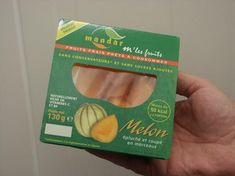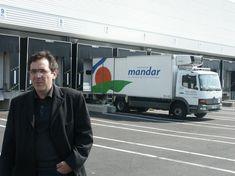

The Mandar Group, a wholesale fixture on the Parisian wholesale market since 1976, has recently moved to a state-of-the-art 8,000 square metre facility that moves the company onto a new stage.
No longer a wholesale specialist, Mandar has added a number of strings to its bow. The new home houses consolidation and packing facilities for its work for Carrefour internet shopping service Ooshop, 26 loading bays with automatic levellers for its international wholesale, catering and secondary wholesale operations and a hi-care preparation facility for a venture in fresh-cut fruit.
It also provides scope to expand the company's herb business, run by Lucy Abramsczik, which despite accounting for just euro5 million of a total turnover of euro85m, is perceived by many to be Mandar's biggest strength.
General manager of catering Pierre Rizzo says the shining headquarters is an indication of the company's desire to stand out from its competitors and emphasise a customer-driven approach not always associated with the market. “This facility has been designed to make us adaptable to the requests of our customers. This is what makes us different to the competition and we will continue to comply with every demand of our customers ñ financially, commercially and ethically,”
The Mandar approach is to first ask the customer what it wants, to what specification and on what payment and delivery terms. The job then is to manage the entire process to arrive at the required end result. “This is the basis of a true partnership,” says Rizzo. “If you have predetermined rules and both parties stick to them, there is no risk to the client.
“It is not just that we have melons and have decided to offer them fresh-cut,” he says, referring to the newest entrant to the Mandar portfolio. “Our customers have asked for this and we have responded by investing in our commitment to them.
The innovation inside the facility, says Rizzo, is not in the individual parts of the new machinery, but in the way the sum total has been knitted together with specific customer needs in mind.
He adds that the fresh produce industry in the past has concentrated too heavily on price and limited its ability to move forward on quality and safety. “We have learnt from this and put a stop to it. An ethical stance is not just words ñ at Mandar it is a constant thread in our strategy.”
The management structure at Mandar has benefited from a successful succession policy, which has seen members of the owning Abramsczik clan continue the chain and maintain family values. The average age of the management team is now under 40, another advantage in the fast-changing fresh produce world, says Rizzo.
“Logically as a family business, social responsibility is high on our priority list,” he adds. “We have a different vision of what a company should achieve, a long-term desire to continue the story and one that is not profit-dominated. The development we have here has not necessarily been designed for immediate results. It's our house, it's our employees' house, and we like to work in good surroundings that will provide us with a sustainable business.”
The quality of the facility is of course also integral to the ambition of the group to satisfy its customers. “We have our culture and values in place ñ we now have to take the requirements of our customer and dovetail the two things together.
“Traditionally wholesalers have tried to maximise their margins, normally getting that leverage upstream rather than downstream. It is easier to explain your margins to suppliers than competitors. We want to be totally transparent and use our expertise as an interface to optimise quality, consistency of availability and price and add value to our service for all our clients.”
The real expertise, he believes, lies in evaluating a range of prices that is suitable for each customer without limiting the ability to supply a freshness and quality of product that does justice to both supplier and customer. “We are here to listen to both sides and provide relevant information at all stages,” says Rizzo. “These days, the quality of fruit and vegetables is more or less a given ñ the way we differentiate ourselves and segment and market our offer will determine our success.”
There have been examples of companies taking on additional roles in Rungis, but Rizzo believes that the concepts of adding value were ahead of their time when first introduced. Some firms, he says, were forced into integrating back down the chain to invest in production. Mandar is already a large-scale producer of herbs, but believes that specialisation is the way forward.
Middlemen have taken a bit of a battering in France in recent times. “The common view, for example,” he says, “is that growers should be moving through to the marketing role. This industry is one of the last to develop in this way and there will always be a place for the good marketing and distribution specialists.”
UK VISION
Mandar is interested in expanding its interest in the UK market, both as a supplier and customer, says export manager Pierre Bensoussan. “We are not supplying the UK directly yet,” he says, “but we are looking for partnerships on a long-term basis with companies that share our vision and cultural beliefs.
“We don't want to set ourselves up in the UK, but would be extremely interested in a joint venture.”
This represents a think international, act local policy. The UK grower can certainly not be accused of sharing this approach, but Rizzo thinks this could change. “We have always seen the UK as a client. However, I sense a change in the agricultural policy of the British government, which is more in favour of producers. There has also been an improvement in the structure of the production sector in the UK and I think it will become a competitive supplier to the French market within the next three years.
“UK growers, particularly of top fruit and soft fruit, are becoming more competitive in the UK, but there is definitely scope for them to be competitive in France too. Other UK-grown products such as asparagus could also become more of a force in the export market if the progress continues. It is not a question of tonnage, but the fact that the produce is high quality and meets all the safety and social criteria to make it attractive to buyers.
“In Europe, agriculture is part of our culture, whereas in countries like Morocco and Turkey - which are good suppliers - it is more an economic vision. I think the UK can use this advantage and build its stature overseas.”






No comments yet